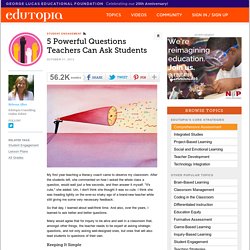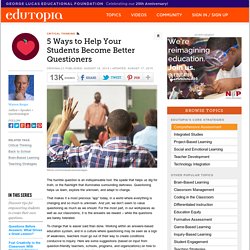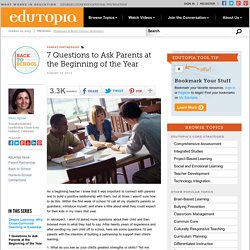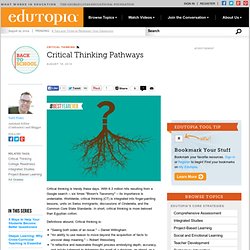

#1: Getting Mentally Prepared and Focused. #2: First Day Game Plan (Back-to-School Countdown) #3: Creating Trust and Security with Your Students (Back-to-School Countdown) #4: Establishing a Purposeful Culture (Back-to-School Countdown) #5: Thinking About Physical Space (Back-to-School Countdown) #6: Instructional Design: Have Conversations with Your Colleagues (Back-to-School Countdown) #7: Instructional Design: What are My Big Units? (Back-to-School Countdown) #8: Creating Space for Learning Experiences (Back-to-School Countdown) #9: Making Sense of the Standards. #10: Start with the End in Mind (Back-to-School) 5 Powerful Questions Teachers Can Ask Students. My first year teaching a literacy coach came to observe my classroom.

After the students left, she commented on how I asked the whole class a question, would wait just a few seconds, and then answer it myself. "It's cute," she added. Um, I don't think she thought it was so cute. I think she was treading lightly on the ever-so shaky ego of a brand-new teacher while still giving me some very necessary feedback. So that day, I learned about wait/think time.
Many would agree that for inquiry to be alive and well in a classroom that, amongst other things, the teacher needs to be expert at asking strategic questions, and not only asking well-designed ones, but ones that will also lead students to questions of their own. Keeping It Simple I also learned over the years that asking straightforward, simply-worded questions can be just as effective as those intricate ones. . #1. This question interrupts us from telling too much. 5 Ways to Help Your Students Become Better Questioners.
The humble question is an indispensable tool: the spade that helps us dig for truth, or the flashlight that illuminates surrounding darkness.

Questioning helps us learn, explore the unknown, and adapt to change. That makes it a most precious “app” today, in a world where everything is changing and so much is unknown. And yet, we don’t seem to value questioning as much as we should. For the most part, in our workplaces as well as our classrooms, it is the answers we reward -- while the questions are barely tolerated. To change that is easier said than done.
How to Encourage Questioning 1. Asking a question can be a scary step into the void. 2. This is a tough one. 3. Part of the appeal of “questions-only” exercises is that there’s an element of play involved, as in: Can you turn that answer/statement into a question? 4. 5. If the long-term goal is to create lifelong questioners, then the challenge is to make questioning a habit -- a part of the way one thinks. 7 Questions to Ask Parents at the Beginning of the Year. As a beginning teacher I knew that it was important to connect with parents and to build a positive relationship with them, but at times I wasn't sure how to do this.

Within the first week of school I'd call all my student's parents or guardians, introduce myself, and share a little about what they could expect for their kids in my class that year. In retrospect, I wish I'd asked more questions about their child and then listened more to what they had to say. After twenty years of experience and after sending my own child off to school, here are some questions I'd ask parents with the intention of building a partnership to support their child's learning. 1. What do you see as your child's greatest strengths or skills? 2. 3. Critical Thinking Pathways.
Critical thinking is trendy these days.

With 6.3 million hits resulting from a Google search -- six times "Bloom's Taxonomy" -- its importance is undeniable. Worldwide, critical thinking (CT) is integrated into finger-painting lessons, units on Swiss immigrants, discussions of Cinderella, and the Common Core State Standards. In short, critical thinking is more beloved than Egyptian cotton. Definitions abound. Critical thinking is: "Seeing both sides of an issue. " -- Daniel Willingham "An ability to use reason to move beyond the acquisition of facts to uncover deep meaning. " -- Robert Weissberg "A reflective and reasonable thought process embodying depth, accuracy, and astute judgment to determine the merit of a decision, an object, or a theory.
" -- Huda Umar Alwehaibi "Self-guided, self-disciplined thinking which attempts to reason at the highest level of quality in a fair-minded way. " -- Linda Elder Jarno M. Meanwhile, watch out for CT posers.